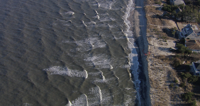DELAWARE - Rising costs for beach replenishment have put the Delaware Department of Natural Resources and Environmental Control (DNREC) in a tough spot, prompting them to consider alternative funding methods. This includes potentially asking coastal towns to contribute finically.
DNREC says the current model, with 65% of funding from the federal government and 35% from the state, is no longer sustainable. With costs totaling $278 million over the past two decades, they say in 5 years they will be strained to continue at the current rate.
In a statement to WBOC, a representative from DNREC said in part;
"DNREC remains interested in reducing its costs and stretching its funding for shoreline management as far as possible, which is why we have partnerships with the USACE and why we pursue relevant grant opportunities. Open and honest discussion is a critical part of developing DNREC’s Economic Analysis for Shoreline Management study. In addition to two planned community workshops, DNREC has engaged a dedicated group of subject matter experts, county representatives, and community representatives to participate in the process."
The Association of Coastal Towns (ACT) issued a multi-page statement expressing concerns about the composition of the study group, asserting that it is heavily weighted with DNREC representatives.
DNREC responded saying,
"The Association of Coastal Towns and the Bay Beach Alliance were each initially asked to send two representatives for the working group, one primary and one alternate. The working group also may expand over the course of the study as needed to ensure the high quality of the final report."
The association argues that the tourism generated by these coastal communities justifies state investment and suggests that DNREC explore alternative funding sources.
Rehoboth Beach Mayor Stan Mills, who sits both on ACT and the study group, says the coastal towns cannot just come up with an essential funding cost,
“We don’t have deep pockets, we don’t have a treasure chest, we don’t have a light switch that we just flick and all of a sudden we have half a million million dollars more in our pocket.” said Mills.
"The coastal activity contributes almost 7 billion dollars, that's with a B, to the entire state economy, and as such we all believe it should be the state funding these projects." he continued.
The study is expected to be completed in late 2024, DNREC confirmed projects already underway will not be affected by any funding changes.






